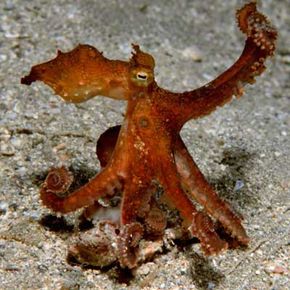Octopus Personality and Lucretia McEvil
Octopuses in captivity present researchers with an excellent opportunity to learn more about their personas. Research on the octopus is still relatively new due to the animal's reclusive nature. It's fairly well-accepted among researchers that the octopus is an intelligent creature – stories abound of those octopuses that manage to escape from their aquariums to pry open bins of food, and those that learn to solve mazes or pick up red balls as opposed to white ones [source: Stewart]. But could they have personalities?
After she heard that some interesting octopus characters at the Seattle Aquarium were given names – a practice generally reserved only for the most advanced species – marine biologist Jennifer A. Mather wanted to find out the answer. Thus, Leisure Suit Larry, a particularly touchy-feely octopus; Emily Dickinson, a recluse; and Lucretia McEvil, who destroyed the interior of her tank, became the starting point for a revealing study.
Advertisement
To be fair, personality is a hard thing to prove, but Mather and marine biologist Roland C. Anderson pinned down a method for the study: They would identify a number of personality traits and then rate each animal against each of those traits. They exposed 44 red octopuses to three different situations seven times, each for a period of two weeks. Did the octopuses show personality? The answer was a resounding yes. In all, the test octopuses displayed 19 distinct behaviors, which the researchers categorized into three buckets – activity, avoidance and reactivity. Emily Dickinson, for example, would have been rated low on activity, high on avoidance and low on reactivity because she liked to stay in her den no matter what. You can find more about the personality study in the February 2007 issue of Natural History.
Mather and Anderson went on to find that octopuses apply their intelligence to practical situations as well; they wanted to see if an octopus would change its eating methods when presented with different kinds of prey. What would an octopus do if it found a clam difficult to pry open, for example? Anderson and Mather gave the octopuses clams that are usually simple to open, but wired them shut. Not to be outdone, the octopuses simply switched to drilling into the shell to get at the succulent meat. The two scientists also observed that after just a few unsuccessful tries, juvenile giant Pacific octopuses quickly learned how to efficiently drill near the center of a clam to get at the meat inside [source: Mather].
Related Articles
Sources
- "A Legend of the Deep" Nature. PBS Educational Broadcasting Corporation. http://www.pbs.org/wnet/nature/octopus/legend.html
- "Cephalopod." Microsoft Encarta Online Encyclopedia. 2007. http://encarta.msn.com
- "Cephalopods." Smithsonian National Zoological Park. https://ocean.si.edu/ocean-life/invertebrates/cephalopods
- "Common Octopus." National Geographic. http://animals.nationalgeographic.com/animals/invertebrates/common- octopus.html?nav=A-Z
- "Giant Pacific Octopus." National Geographic. http://animals.nationalgeographic.com/animals/invertebrates/giant-pacific- octopus.html
- Helm, Burt, and Adam Aston. "Taking Lessons in Optics from the Octopus." Business Week. (Jan 31, 2005): 62. (Jan. 26, 2008) http://find.galegroup.com/ips/start.do?prodId=IPS
- Mather, Jennifer A. "Eight Arms, with attitude: octopuses count playfulness, personality, and practical intelligence among their leading character traits." Natural History 116.1 (Feb. 2007): 30(7). https://www.bennington.edu/sites/default/files/sources/docs/Sherman_eight%20arms.pdf
- Mayell, Hillary. "Octopus Arms May Point Way to New Robot Designs." National Geographic News. Feb. 9, 2005 https://www.mail-archive.com/europa@klx.com/msg04406.html
- "Mollusk." Microsoft Encarta Online Encyclopedia 2007. http://encarta.msn.com
- "Not such suckers." The Economist (US) 319.n7711 (June 15,1991): 82(2) (Jan. 27, 2008) http://find.galegroup.com/ips/start.do?prodId=IPS
- Pickrell, John. "'Walnut-Size' Male Octopus Seen Alive for First Time." National Geographic News. Feb. 12, 2003.
- Roach, John. "Newfound Octopus Impersonates Fish, Snakes." National Geographic News. Sept. 7, 2001. http://news.nationalgeographic.com/news/2001/09/0920_octopusmimic.html
- Roach, John. "Octopus Arms Found to Have 'Minds' of Their Own." National Geographic News. Sept. 7, 2001 http://news.nationalgeographic.com/news/2001/09/0907_octoarm.html
- Scheel, David. "Giant Octopus: Fact Sheet." August 10, 2001. http://marine.alaskapacific.edu/octopus/factsheet.html
- "Sea Chameleons." Nature. PBS Educational Broadcasting Corporation. http://www.pbs.org/wnet/nature/octopus/chameleons.html
- Stewart, Doug. "Armed but not dangerous: is the octopus really the invertebrate intellect of the undersea world?" National Wildlife 35.n2 (Feb-March 1997): 32(8). (Jan. 27, 2008) http://find.galegroup.com/ips/start.do?prodId=IPS
- Wheeler, K. and D. Fautin. 2001. "Cephalopoda" (on-line), Animal Diversity Web. (Jan. 25, 2008) http://animaldiversity.ummz.umich.edu/site/accounts.information/Cephalopoda.ht ml
- "Wizards of the Sea." National Geographic Kids. (Feb. 5, 2008) http://www.nationalgeographic.com/ngkids/0410/index.html
